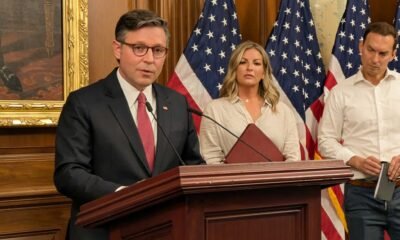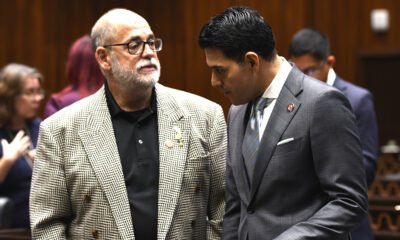DC Bureau
U.S. House Pulls Off Last-Minute Victory to Prevent Government Shutdown; Senate Takes Next Step

WASHINGTON — The U.S. House of Representatives approved a stopgap spending bill on Friday night, aimed at maintaining government operations for a few more months. This vote unfolded amidst a contentious 48-hour debate that hinted at the challenges of President-elect Donald Trump’s upcoming term.
The stopgap legislation, marking its third rendition this week, grants Congress until mid-March to finalize twelve comprehensive government funding measures. It also allocates approximately $100 billion for natural disaster relief.
In a decisive 366-34 vote, with one Democrat choosing to vote “present,” the bill now progresses to the Senate. There, bipartisan support will be crucial to ensure its passage before the impending midnight funding deadline, requiring consensus among all 100 senators.
Notably, the bill refrains from including any adjustments to the debt limit, a significant point of contention raised by Trump. This issue will now be deferred until the following year when Trump holds sway over both Congress and the White House.
Spanning 118 pages, the legislation extends programs established in the five-year farm bill through September. This extension aims to provide lawmakers additional time to negotiate a comprehensive deal, despite being over a year behind schedule.
The approved package permits Congress members to receive their first cost-of-living salary adjustment since January 2009, incrementing their pay from $174,000 to a maximum of $180,600 next year. However, it excludes a previously considered provision allowing year-round sales of E15 blended gasoline nationwide, a potential boon for corn growers and biofuel proponents.
As the House deliberated, the White House expressed support for the bill. Press Secretary Karine Jean-Pierre underscored that, while the bill does not address every request, it includes crucial disaster relief for storm-affected communities and ensures the government operates at full capacity.
House Appropriations Chairman Tom Cole (R-Okla.) advocated for the bill, emphasizing the necessity of avoiding a government shutdown. He asserted, “Governing by continuing resolution is never ideal, but Congress has a responsibility to keep the government open and operating for the American people.”
Conversely, Connecticut Democratic Rep. Rosa DeLauro criticized the bill, particularly targeting Republican negotiators who strayed from the earlier bipartisan agreement. She raised concerns about Elon Musk’s influence in the legislative process, questioning who truly holds power in Congress.
Confusion reigned earlier in the week when bipartisan cooperation seemed achievable. However, Trump’s involvement disrupted this momentum, as he pressed for immediate action on raising the debt limit.
An earlier GOP-only stopgap bill failed to garner support, leading to the current version’s passage. Speaker Mike Johnson expressed confidence in his party’s unity, stating that avoiding a government shutdown and meeting obligations to various stakeholders were priorities.
Had the House and Senate not reached an agreement by the deadline, a partial government shutdown would have ensued, coinciding with the holiday season. Essential functions would continue, but federal workers, including military personnel, would face delayed paychecks.
In a social media post, Trump maintained that any temporary spending strategy must extend the debt ceiling significantly. “Congress must get rid of, or extend out to, perhaps, 2029, the ridiculous Debt Ceiling,” he stated, asserting pressure exists on the current administration to resolve this issue.
Last updated 4:22 p.m., Dec. 20, 2024

















